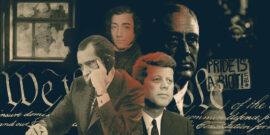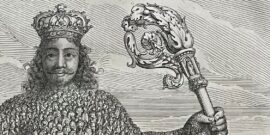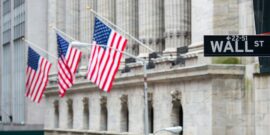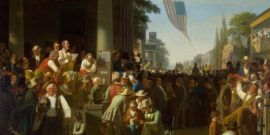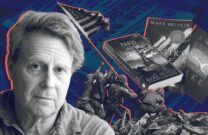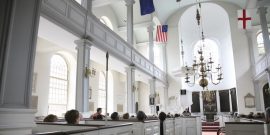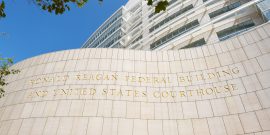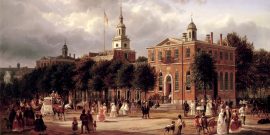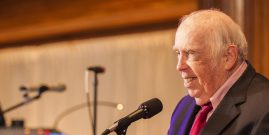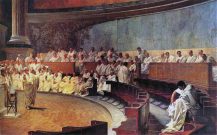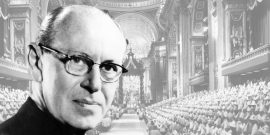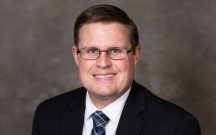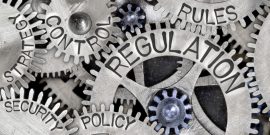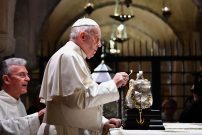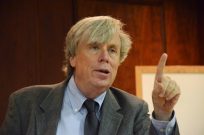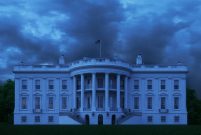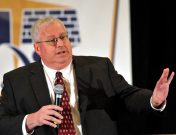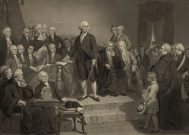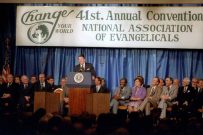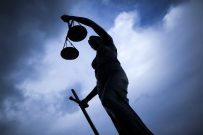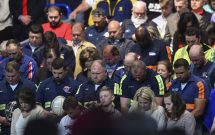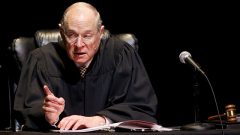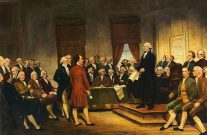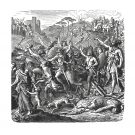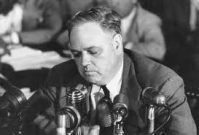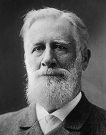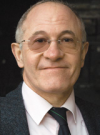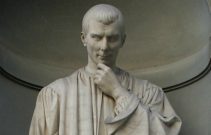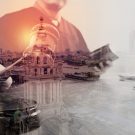America's first revolution was an act of popular government. Our efforts to restore the republic must be also.
Richard M. Reinsch II
Reagan placed fusionism at the center of his efforts for American renewal.
Eighty years after its initial publication, Hayek's masterpiece still resonates.
John Gray asks whether a sane liberalism can prevail against the forces of identity politics and other forms of hyper-liberalism in the West.
Marco Rubio presents himself as an advocate for workers and families in his new book, but economic growth might help them more.
A Spy Among Friends tells a story of friendship, treachery, and justice in MI6.
Regime Change looks to build up a traditional society while trashing America's own traditions.
Frank Meyer’s conservative ideal does not provide a policy template, but it remains, in essence, the model conservatives will return to for clear thinking.
Do we still have the strength and wisdom we need to confront a hostile world?
A salutary form of populism can challenge the post-democratic rule of elites. But can it govern?
Kendall sought to define an American conservatism rooted in our major documents and debates.
America’s robustness has been built on commerce and the discipline and virtues it requires.
A natural-rights defense of religious liberty must take care to protect fully the freedoms of religious institutions.
Codevilla counseled Americans to think coherently about their interests and the means to secure peace.
Bosch shows there is some measure of justice as well as love and forgiveness in L.A.
How do we ascend from our "culture of repudiation” to the kind of great statesmen that Mahoney profiles in his book?
In the Legislative Reorganization Act, Congress turned itself into an oversight body. Is there a way back?
Willmoore Kendall argued that America can retain its virtue only through a culture articulated and upheld by the institutions of civil society.
M. Stanton Evans translated conservative ideas and insights into politics and policies.
Jocko Willink doesn't talk much about politics. But he does teach the virtues needed to admit failure, regroup, and attack again.
The wisdom of Captain Bob Wallace saves Christmas, not only for the Haynes Sisters, but for General Waverly, the Columbia Inn, and the old Army unit.
We do not see man as a tool to be managed by the state and its client interests. We see man as an end, possessing liberty and the reason to use it well.
Will America cross over to antiracism and all its works?
Legutko’s incisive short chapters on the problem of freedom aim to recover its hierarchical nature.
I am pleased to share with you the top 5 Law & Liberty podcasts of 2020.
"One nation, under woke, with retributions and grievances for all" is a future we should steadfastly resist.
Murray means to deepen American political truths with a comprehensive sense of the ideas, laws, and institutions that made America possible.
What if the “self” that is “realized” under the conditions of liberal capitalism is a self that despises liberal capitalism?
Joel Kotkin argues that a new class of rulers want to boot and spur contemporary serfs and replace liberalism with an enlightened justice and conformity.
Every crisis is clarifying, generative, and destructive. The Coronavirus War will prove no different.
Caldwell's Age of Entitlement argues that the civil rights state is the anvil upon which our nation wages its incessant political contests.
We aren’t going to spend or policy-wonk our way out of decline and anomie in certain segments of our population.
I am excited to announce that John Grove has joined Law & Liberty as Associate Editor.
Terrence Malick's A Hidden Life demonstrates the call made on one man to rise above tyranny.
The real legacy of woke capital gives shape to an outrage style in politics, one that ultimately threatens free markets.
“The Founders intended the Constitution to promote a way of life, and they understood that to promote a way of life is to promote a kind of person.”
Serving the consumer as the captain of the economy is the price of entry to the dynamism of a market economy.
Orestes Brownson’s view is that America is the prudent compromise between two idealistic extremes.
Orbán threatens the legitimacy of the European Union’s technocratic governance by recalling the much deeper resources of Western civilization.
Meat-cleaver economic nationalism will probably lead us down a path we’ll wish we had never taken.
Solzhenitsyn had become, as the foreign policy analysts say, an existential threat to the Soviet Union. He had to be expelled.
So hard up are the East Germans that they are willing to sell military hardware to their enemies.
If Kavanaugh’s nomination fails, then we enter the process of interminable regime decay.
What happens to the authority of the modern state when it definitively leaves behind the death penalty?
Our post-liberals have diagnosed pathologies in contemporary liberalism, but they have not dealt with the true ground of our discontents.
The Old Breed for Sledge is a paean to what has gone before him, to that which exceeds him.
Peter Augustine Lawler died a year ago today: here are some tributes and our favorites among his essays for Law and Liberty.
Jonah Goldberg’s Suicide of the West introduces us to a (mostly) soulless rhetoric of liberty.
Tocqueville, a much wiser and more prudent thinker than the Encyclopédistes, knew that such abstract political moralizing could only lead to political terror.
Willmoore Kendall’s voice is now the most pressing for our contemporary republican order.
It would have been a welcome surprise for Trump to break with Woodrow Wilson’s precedent of making the SOTU a spoken address to the Congress.
In The Crown, the ideology of autonomy and endless emancipation, one that has shaped the post 1968 imagination, stands under judgment.
Brian Smith will join Law and Liberty as Managing Editor.
President Trump’s inability or unwillingness to lead on a legislative agenda may trigger a renaissance of congressional government.
George Will laments that conservatism has been “hijacked” by “scowling primitives” and “vulgarians.”
What should receive more discussion is the notion of “Liquidating” the meaning of the provisions of the Constitution.
The issue is how to best preserve what is good about American higher education. And that good is found in its diversified excellence.
Mitch Daniels as President of Purdue University points to the immense waste and sheer lack of productivity of higher education in America.
We are told that judicial engagement will not lead to dueling natural rights jurists usurping republican government. But what rights do they see?
The restrained vision of the federal judiciary that has dominated the jurisprudence of right-leaning American legal theorists and lawyers is under fire.
Clint Eastwood’s American Sniper tells the story of Navy Seal Chris Kyle, the deadliest sniper in American military history with 160 confirmed kills.
Is education for the person or for the state?
The present abuse of executive power through and with the administrative state has been generously prepared over many decades.
Amidst the widespread praise of Paul Ryan’s recently announced anti-poverty reforms it appears some criticism is overdue.
Introducing Lauren Weiner as Associate Editor of Law and Liberty.
One can hardly deny that natural rights arguments of a Lockean strain were a key part of that fateful period from 1760-1776.
Rémi Brague argues in a recent argues in a recent essay "The Impossibility of Secular Society" that secular society is a doomed enterprise.
In finding a past they will "use it to create a new present." They will exclaim what a joy it is to be alive.
I come not to argue that we are ill-founded with regard to religious liberty, but to note certain limitations of principles present at our founding.
Harvey Mansfield is searching for the enduring sources of law in a republic?
If you haven't yet stopped by the Liberty Forum then you should plan to read Ralph Hancock, Daniel McCarthy, and Aurelian Craiutu's fine essays.
Richard M. Reinsch II is Editor in Chief and Director of Publications for the American Institute for Economic Research, and a Senior Writer at Law & Liberty. He is coauthor with Peter Augustine Lawler of A Constitution in Full: Recovering the Unwritten Foundation of American Liberty (Kansas Press, May 2019). You can follow him @Reinsch84
